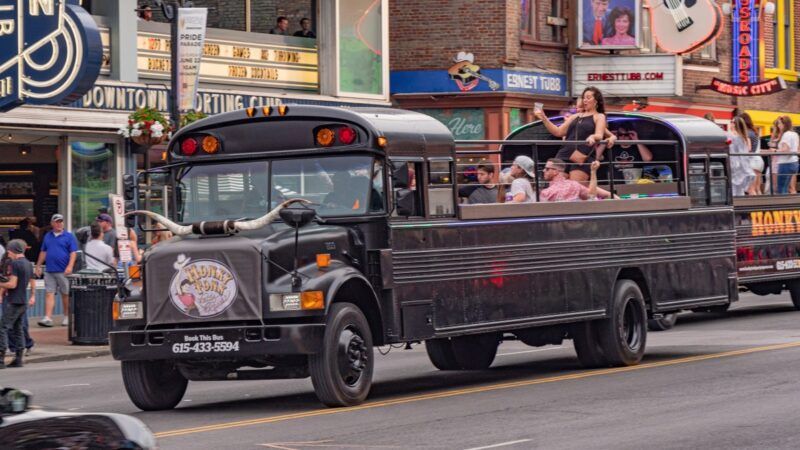Don't Crash Nashville's Boozy Party Bus Culture
No, we don't need more anti-alcohol laws—no matter how rowdy the bachelorette parties get.

Recently lawmakers in Duluth, Minn. rescinded a 100-year-old, Prohibition-era law locals had dubbed "the Footloose ordinance." That law prohibited establishments in Duluth that serve alcohol from allowing patrons to dance unless the business also obtained a separate dancing license, the Minneapolis Star-Tribune reported last month, ahead of a city council vote that repealed the measure unanimously.
What exactly were lawmakers thinking 100 years ago? A compendium of Duluth city ordinances, published in 1922, during the early years of Prohibition, reiterates that alcohol was verboten at dance halls and says dances involving "immodest swaying or moving of the pelvic portion of the body; and [including] the 'slow rag,' 'lovers two-step,' 'bunny hug,' 'turkey trot,' 'Texas Tommy,' [and] 'walk back'"—were engaged in by people of questionable morality.
Though the Duluth story has a golly-gee, quaint, Rockwellian feel, and recent reports indicate no one was ever charged under the ordinance, the fact the law was still on the books after more than 100 years is a reminder of the countless idiotic and pointless alcohol laws Americans must navigate every day. The last thing we need today are burdensome new alcohol laws.
Unfortunately, recent reports—including my own columns about other bad booze rules here, here, here, here, and here—suggest the number of new anti-alcohol laws may be on the rise. That's a shame. After all, many cities and states saw fit rightly to deregulate alcohol sales in response to challenges posed by the COVID-19 pandemic.
One city that appears to be going in the wrong direction is Nashville, where as of this month open-air, motorized, "woo-girl-filled, road-congesting party buses" may no longer allow patrons to possess open containers of alcohol on board, Eater Nashville reports.
"The consumption of beer, ale, wine, or other alcoholic beverages upon or within an unenclosed entertainment transportation vehicle is strictly prohibited," the ordinance declares of the buses, which host rolling private events such as bachelorette parties.
After the ordinance was proposed in October, Nashville party bus owners argued it would "cripple the $62 million industry" and warned it could be "a death sentence for their businesses."
"I wish people would understand that it's not a drunk fest party that the public thinks it is," Susan Pizzitola, owner of the Nashville Party Barge, said at the time, in remarks reported by Main Street Nashville. "My employees are all ABC certified, and we monitor the amount of alcohol that's brought on board, the amount of alcohol that's consumed, and we stop unnecessary behavior."
Nashville's party buses, which Eater dubs "'transpotainment' vehicles," made news in July when a 22-year-old patron was injured when he fell from his perch on a party bus's railing and hit his head on the pavement. The bus subsequently ran over his leg. The bus operator claims the patron who fell was involved in a "stunt." In audio from a 911 call made to report the man's injuries, a caller says he told the man who fell to get off the railing repeatedly before he fell.
Though the party buses (at least the ones that are still unenclosed) are seemingly grounded for now, the ordinance's sponsor introduced a bill that would allow them to operate again, under certain constraints. But it didn't have to be this way. Nashville's city council, which has targeted party buses for some time, likely could have dealt with the matter using different, more sensible, and far-less-intrusive means. For example, the Nashville ordinance doesn't prohibit passengers from being drunk, sitting on railings, or, say, failing to wear seatbelts. It just prohibits drinking alcohol. And, though the ordinance claims "consuming alcohol in an unenclosed vehicle in motion is inherently dangerous," that's likely news to operators of cruise ships, fishing charters, trains that feature open-air bars, and duck boats used to transport numerous World Series and Super Bowl championship teams during parades in Boston.
Nashville's crackdown on party buses is just the latest example of a growing anti-alcohol backlash. Some lawmakers want to swing the pendulum back towards Prohibition. We shouldn't let them.
